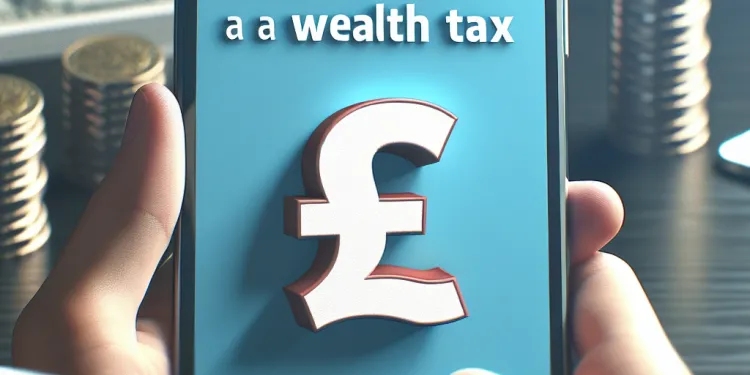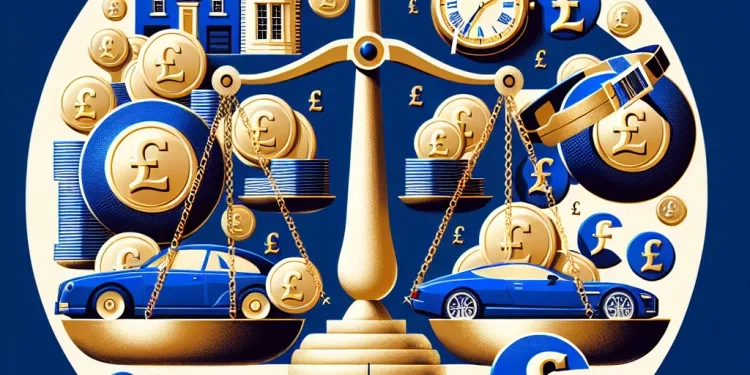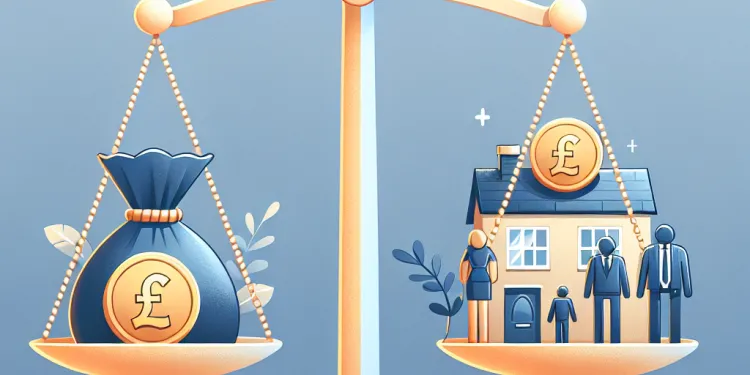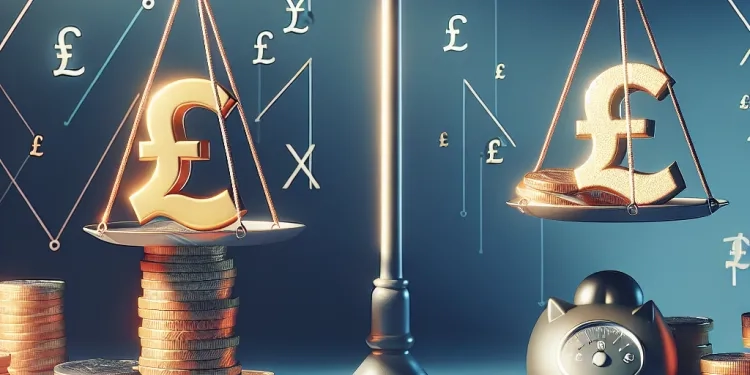
Find Help
More Items From Ergsy search
-

How is a wealth tax typically calculated?
Relevance: 100%
-

Is real estate included in wealth tax calculations?
Relevance: 95%
-

What is a Wealth Tax?
Relevance: 77%
-

How does a wealth tax differ from an income tax?
Relevance: 74%
-

What is the Wealth Tax in the UK?
Relevance: 72%
-

What is the wealth tax in the UK?
Relevance: 72%
-

Can a wealth tax be levied annually?
Relevance: 70%
-

What are the challenges of implementing a wealth tax?
Relevance: 70%
-

Would a wealth tax apply to foreign assets?
Relevance: 69%
-

What is the objective of a wealth tax?
Relevance: 69%
-

Would a wealth tax replace other taxes in the UK?
Relevance: 68%
-

Who is typically subject to a wealth tax?
Relevance: 68%
-

Could a wealth tax encourage tax avoidance?
Relevance: 68%
-

Has the UK ever had a wealth tax?
Relevance: 66%
-

Why doesn't the UK have a wealth tax?
Relevance: 66%
-

What arguments are made for a wealth tax in the UK?
Relevance: 66%
-

What are the administrative costs of a wealth tax?
Relevance: 65%
-

Are there any countries currently implementing a wealth tax?
Relevance: 64%
-

What are common arguments in favor of a wealth tax?
Relevance: 64%
-

Can a wealth tax impact economic behavior?
Relevance: 64%
-

How do economists view the impact of wealth taxes?
Relevance: 64%
-

How might a wealth tax impact inequality in the UK?
Relevance: 64%
-

How do other countries implement a wealth tax?
Relevance: 64%
-

Could a wealth tax affect economic growth in the UK?
Relevance: 64%
-

Has any political party in the UK supported a wealth tax?
Relevance: 62%
-

How might a wealth tax affect wealthy individuals?
Relevance: 62%
-

How does council tax relate to wealth in the UK?
Relevance: 62%
-

How do governments ensure compliance with wealth tax laws?
Relevance: 62%
-

How do I calculate my tax bill?
Relevance: 61%
-

How is inheritance tax calculated?
Relevance: 59%
-

Do unpaid tax debts affect Inheritance Tax calculations?
Relevance: 57%
-

How is the Inheritance Tax bill calculated?
Relevance: 55%
-

How is the tax refund amount calculated?
Relevance: 53%
-

What taxes in the UK target wealth?
Relevance: 48%
-

Do wealth taxes differ between countries?
Relevance: 47%
-

What types of assets are typically subject to a wealth tax?
Relevance: 47%
-

What are common criticisms of a wealth tax?
Relevance: 46%
-

Are there alternatives to a wealth tax for addressing inequality?
Relevance: 46%
-

What exemptions are commonly associated with wealth taxes?
Relevance: 44%
-

How is Stamp Duty calculated in the UK?
Relevance: 44%
Introduction to Wealth Tax Calculation
A wealth tax is typically levied on the net value of the assets owned by an individual. In the UK, this concept has been proposed but not implemented, so understanding how it could be calculated is speculative yet informative. The calculation of a wealth tax usually involves determining the market value of assets, applying a threshold, and then calculating the tax liability based on the tax rate.
Determining Assets and Liabilities
The first step in calculating a wealth tax involves identifying all applicable assets. Commonly taxed assets include properties, savings, investments, pensions, and other forms of wealth such as luxury goods or art collections. It's essential to assess each asset's market value to obtain an accurate overall portfolio worth. Conversely, liabilities such as mortgages or other debts directly connected with the assets are deducted to arrive at the net wealth.
Valuing the Assets
Asset valuation is crucial in the wealth tax calculation. Properties are typically valued at their current market rate. Investment portfolios are assessed based on the current stock and bond values, while savings accounts are valued at their present balance. For complex assets like businesses or unlisted shares, expert appraisal may be necessary. The sum of all these values, after considering debts, provides the total net wealth subject to taxation.
Applying the Threshold
In proposals, a wealth tax often comes with a threshold, meaning only wealth above a certain limit is taxed. For example, if the threshold is set at £1 million, only the wealth above this amount is considered taxable. The threshold level determines the tax base and is a crucial element of policy discussions, particularly regarding fairness and effectiveness.
Calculating the Tax Liability
Once the taxable wealth is identified, the next step is to apply the tax rate. Wealth tax rates can vary; proposals often suggest a low percentage, such as 1% or 2%, to prevent excessive burdens on taxpayers. The taxable amount, determined by subtracting the threshold from the total net wealth, is multiplied by the tax rate to find the tax liability. For instance, if taxable wealth is £500,000 and the tax rate is 1%, the wealth tax due would be £5,000.
Potential Exemptions and Reliefs
Many wealth taxes around the world feature exemptions or reliefs. Policymakers may exempt certain asset types or offer relief for specific situations, such as business assets to promote entrepreneurship. These provisions aim to make the tax more equitable and economically viable.
Conclusion
While the UK does not currently implement a wealth tax, understanding how it could be calculated helps inform discussions on economic policy. Key components in this process include accurately valuing assets, applying a fair threshold, and determining the appropriate tax rate, along with considering potential exemptions and reliefs.
What Is Wealth Tax?
Wealth tax is a type of tax that you pay on the value of what you own. This includes things like houses, money in the bank, and other valuables. In the UK, we don't have this tax yet, but it's good to know how it might work. To figure out how much tax you would pay, you need to know how much your things are worth and see if they go over a certain amount. Then, you use the tax rate to work out how much you owe.
What Do You Own and Owe?
First, you need to list everything you own that could be taxed. This includes houses, savings, investments, pensions, and special items like art. You also need to know what you owe, such as money you borrowed for a house. The things you own minus what you owe give you your net wealth.
How to Find Out What Your Things Are Worth
Knowing how much your things are worth is important. Houses are usually priced at what they would sell for now. Investments and savings are counted at their current value. Sometimes, you might need an expert to tell you how much a business or rare item is worth. Add up all these values, take away any debts, and you'll know your net wealth.
Deciding the Taxable Amount
A wealth tax only applies if your things are worth more than a certain amount, called a threshold. If this threshold is, say, £1 million, anything over that amount can be taxed. Deciding what this threshold should be is important so the tax is fair.
How Much Tax Do You Pay?
Once you know how much of your wealth is above the threshold, you apply the tax rate. This rate might be small, like 1% or 2%. For example, if you have £500,000 that can be taxed and the rate is 1%, you would pay £5,000 in tax.
Special Rules and Exceptions
Sometimes, there are special rules that mean you don't have to pay tax on certain things. For instance, some business assets might be excluded to help people start or run a business. These rules help to make the tax fairer.
Wrapping Up
The UK doesn't have a wealth tax right now, but knowing how it works is important. Working out a wealth tax means knowing what you own and owe, setting a fair threshold, picking a good tax rate, and thinking about special rules to make it fair for everyone.
Frequently Asked Questions
What is a wealth tax?
A wealth tax is a tax on an individual's net worth, the total market value of all assets owned minus liabilities owed.
How is a wealth tax calculated?
A wealth tax is typically calculated by assessing the market value of an individual's total assets, subtracting their debts, and applying a tax rate to the net wealth.
What assets are included in wealth tax calculations?
Assets such as real estate, stocks, bonds, savings, and other valuable possessions are typically included in wealth tax calculations.
Are liabilities considered in wealth tax calculations?
Yes, liabilities such as mortgages, loans, and other debts are subtracted from the total asset value to determine net wealth.
What is the tax rate for a wealth tax?
The tax rate for a wealth tax varies by jurisdiction, but it is often a small percentage, such as 1% or 2%, of the net worth.
Do wealth taxes have exemptions or thresholds?
Yes, many jurisdictions implement a threshold where only net worth above a certain amount is taxed, and some assets may be exempt.
How often is wealth assessed for tax purposes?
Wealth is typically assessed annually for tax purposes.
How do changes in asset value affect wealth tax?
Fluctuations in asset value, like real estate or stock prices, can directly impact the amount of wealth tax owed each year.
Is wealth tax applicable to both residents and non-residents?
This depends on jurisdiction, but some countries may apply a wealth tax to both residents and non-residents on assets located within the country.
How do inheritance and gifts factor into wealth tax?
Inheritance and gifts may increase an individual's net worth and can affect wealth tax calculations, depending on local laws.
Are retirement accounts included in wealth tax assessments?
This varies by jurisdiction. Some countries might include retirement accounts in assessments, while others might exempt them.
Can wealth taxes incentivize certain financial behaviors?
Yes, wealth taxes can incentivize financial behaviors such as increased spending, investment in exempt assets, or moving wealth to tax-favorable jurisdictions.
How might tax avoidance affect wealth tax collections?
High net-worth individuals might employ strategies to minimize their wealth tax liability, potentially affecting the amount collected by governments.
Are there international standards for wealth tax calculations?
There are no uniform international standards, as wealth tax calculations depend on specific national or regional laws.
How does a wealth tax differ from a property tax?
A property tax is levied on real estate property, while a wealth tax applies to an individual's entire net worth, including various types of assets.
Are there any common criticisms of wealth taxes?
Criticisms include potential discouragement of savings and investment, challenges in accurately valuing assets, and the relocation of wealthy individuals to lower-tax areas.
How do jurisdictions ensure compliance with wealth tax laws?
Jurisdictions may implement stringent reporting requirements and audits to ensure individuals accurately report their assets and liabilities.
What happens if someone cannot pay their wealth tax?
Penalties or interest might be imposed, and severe non-compliance could lead to legal actions, depending on local laws.
Does the wealth tax impact economic inequality?
Wealth taxes aim to reduce economic inequality by redistributing wealth, though the effectiveness of this approach is debated.
How do wealth taxes affect government revenue?
By taxing net worth, governments can increase public revenue, which may be used for public welfare projects and services.
What is a wealth tax?
A wealth tax is when people pay money to the government based on how much money and things they own. If someone has a lot of money, they might have to pay more. This helps the government get money to pay for things like schools and roads. To make reading easier, try these tools: - **Use a ruler or finger** to follow the words. - **Read out loud** to help understand better. - **Take breaks** if it feels too long or hard.A wealth tax is a type of tax. It is based on how much money and things someone owns. To figure it out, add up everything someone owns, like houses, cars, and savings. Then, take away any money they owe, like loans. That's their net worth, and the tax is based on that.
How do you figure out a wealth tax?
A wealth tax is a tax on what you own. This can be money, houses, or things worth a lot.
Here's how you work it out:
- Add up how much everything you own is worth.
- See if it is more than the limit set by the government.
- If it is, the tax is a small part of what you own.
If you need help, you can:
- Use a calculator.
- Ask someone you trust for help.
- Use apps that help with money, like budgeting tools.
A wealth tax is a kind of tax where people pay money based on what they own. Here's how it works:
1. First, you find out how much all your things are worth. This means adding up the value of everything you own, like your house, car, and other things.
2. Then, you take away any money you owe, like loans or credit card debt.
3. The amount you have left is called your net wealth.
4. Finally, you pay a small part of that net wealth as a tax to the government.
You can use a calculator to help with the math. You can also ask a family member or a friend for help if you find it tricky.
What things are counted in wealth tax?
Wealth tax means you pay money to the government because you own valuable things.
Here is what is usually counted in wealth tax:
- Houses and buildings
- Land
- Cars
- Jewelry
- Money in the bank
- Stocks and shares
Tips to understand better:
- Make a list of what you own.
- Use a calculator to add up the value.
- Ask a friend or family to help explain.
Things you own that are worth money, like houses, shares in companies, savings, and other important things, are usually counted when working out how much wealth tax you owe.
Do debts count in wealth tax?
Yes, things like mortgages, loans, and other debts are taken away from the total of what you own to find out how much net wealth you have.
How much tax do you pay for having a lot of money?
If you have a lot of money and things, the government might ask you to pay a special tax. This is called a "wealth tax."
The tax rate tells you how much money you need to pay. To find out your tax rate, you might want to:
- Ask a tax expert for help.
- Use online tools to get more information.
- Read simple guides or ask someone to explain.
The amount of money you pay for a wealth tax can change depending on where you live. Usually, it is a small part of the money you have, like 1% or 2% of everything you own.
If you find reading hard, using tools like text-to-speech can help. You can also ask someone to read it to you.
Are there any rules for who pays wealth taxes?
Some people might not have to pay wealth taxes. This can depend on how much money or things they own. Rules might say that only people with a lot of money need to pay. This means there can be limits or exceptions.
To understand more, you can:
- Ask someone to explain it to you.
- Use simple guides or videos online.
- Talk to a tax helper or professional.
Yes, many places have a rule where only the money and things you own over a certain amount are taxed. Some things you own might not be taxed at all.
How often do we check money for taxes?
Every year, the government checks how much money and things people own to decide on taxes.
How do changes in what something is worth affect the money you pay for taxes?
Changes in how much things like houses or stocks are worth can change how much tax you have to pay on your money each year.
Here are some tools to help you:
- Use a calculator to help with numbers.
- Ask someone you trust to explain if you are confused.
- Look at pictures to see what these things look like.
Do residents and non-residents have to pay wealth tax?
This can change based on where you live. Some countries might make you pay a type of tax called a "wealth tax". This tax can be for people living in the country or people from other places. It is on things you own that are in that country.
How do inheritance and gifts affect wealth tax?
When someone inherits money or gets a gift, it can change how much tax they have to pay. This is called wealth tax.
If you get money or things from someone after they pass away, it’s called inheritance. If someone gives you money or things as a gift, it’s treated differently for tax.
Sometimes, people might have to pay extra tax if they have a lot of these kinds of money or things. It’s important to know the rules about this tax.
Here are some tools that can help:
- Ask a family member or friend to explain it to you.
- Talk to a helper, like a tax expert, who knows about this tax.
- Use a calculator online to see how much tax you might need to pay.
When a person gets money or things from someone who has died, or when someone gives them a gift, it can make them have more money. This might change how much tax they pay, but this depends on the rules where they live.
Helpful tips: If reading is tricky, try using a ruler or your finger to follow the words. You can also ask someone to read with you or use an audiobook to listen to the text.
Do you pay wealth tax on retirement accounts?
This depends on where you live. Some places might count your retirement money when they check how much you have, but other places might not.
Do taxes on money make people change how they use it?
Yes, wealth taxes can make people change how they use their money. They might spend more, buy things that don't get taxed, or move their money to places where taxes are lower.
How does avoiding tax change the money we collect from wealth tax?
Rich people sometimes use special ways to pay less money in taxes. This can mean the government gets less money.
Is there a worldwide rule for working out wealth tax?
Every country or region has its own rules for calculating wealth tax. There are no rules that are the same for everyone around the world.
What is the difference between a wealth tax and a property tax?
A wealth tax is money paid on everything you own, like money, houses, and cars.
A property tax is money paid only on things like a house or land.
Tools like pictures and videos can help make this easier to understand.
A property tax is a tax you pay for owning a house or land. A wealth tax is different. It is a tax on everything a person owns, like money, houses, and other valuable things.
Do people have problems with wealth taxes?
People say there might be problems, like making people save and invest less money. It can be hard to figure out how much things are worth. Rich people might move to places where they don't have to pay as much tax.
If reading is hard, try using tools like text-to-speech to listen instead. You can also use a highlighter to help focus on the words. Reading with a friend or asking someone to explain can make it easier too.
How do places make sure people follow wealth tax rules?
A wealth tax is money that rich people give to the government. It is a part of keeping things fair. Places need ways to check if people pay this tax. Here are some easy ways they check:
- They look at what people own and how much money they make.
- They ask people to show papers like bank statements and property lists.
- They let people know how to pay their taxes.
- They use computers to help keep track of taxes.
- They check if people are paying like they should.
Helpful tools:
- Ask an adult if you need help understanding tax papers.
- Use a calculator to add up money.
- There are apps that can help you track money.
Governments might make strict rules for reporting money and belongings. They do this to make sure people tell the truth about what they own and what they owe.
What if a person cannot pay the money they owe for being rich?
If someone cannot pay their tax for being rich, they should talk to the tax office. The tax office can help by:
- Giving more time to pay
- Making a plan to pay a bit at a time
- Offering help to understand money better
Using a calculator or asking an adult to help with numbers can make it easier.
If you break the rules, you might have to pay extra money. This can be a penalty or interest. If you don't follow the rules a lot, you might get into big trouble with the law. This depends on the rules where you live.
Tip: It can help to use a calendar or reminders to keep track of important dates. You can also ask a friend or a grown-up for help.
Does the wealth tax change the gap between rich and poor?
Wealth taxes are a way to share money more fairly. They try to make sure rich and poor people have closer amounts of money. Some people think it works well, but others are not sure.
How do taxes on rich people make money for the government?
When the government collects money from people who own lots of things, it can get more money to help everyone. The government can use this money to make things better for everyone, like building parks, schools, and hospitals.
Useful Links
Have you found an error, or do you have a link or some information you would like to share? Please let us know using the form below.
-->
This website offers general information and is not a substitute for professional advice.
Always seek guidance from qualified professionals.
If you have any medical concerns or need urgent help, contact a healthcare professional or emergency services immediately.
Some of this content was generated with AI assistance. We’ve done our best to keep it accurate, helpful, and human-friendly.
- Ergsy carfully checks the information in the videos we provide here.
- Videos shown by Youtube after a video has completed, have NOT been reviewed by ERGSY.
- To view, click the arrow in centre of video.
- Most of the videos you find here will have subtitles and/or closed captions available.
- You may need to turn these on, and choose your preferred language.
- Go to the video you'd like to watch.
- If closed captions (CC) are available, settings will be visible on the bottom right of the video player.
- To turn on Captions, click settings .
- To turn off Captions, click settings again.
More Items From Ergsy search
-

How is a wealth tax typically calculated?
Relevance: 100%
-

Is real estate included in wealth tax calculations?
Relevance: 95%
-

What is a Wealth Tax?
Relevance: 77%
-

How does a wealth tax differ from an income tax?
Relevance: 74%
-

What is the Wealth Tax in the UK?
Relevance: 72%
-

What is the wealth tax in the UK?
Relevance: 72%
-

Can a wealth tax be levied annually?
Relevance: 70%
-

What are the challenges of implementing a wealth tax?
Relevance: 70%
-

Would a wealth tax apply to foreign assets?
Relevance: 69%
-

What is the objective of a wealth tax?
Relevance: 69%
-

Would a wealth tax replace other taxes in the UK?
Relevance: 68%
-

Who is typically subject to a wealth tax?
Relevance: 68%
-

Could a wealth tax encourage tax avoidance?
Relevance: 68%
-

Has the UK ever had a wealth tax?
Relevance: 66%
-

Why doesn't the UK have a wealth tax?
Relevance: 66%
-

What arguments are made for a wealth tax in the UK?
Relevance: 66%
-

What are the administrative costs of a wealth tax?
Relevance: 65%
-

Are there any countries currently implementing a wealth tax?
Relevance: 64%
-

What are common arguments in favor of a wealth tax?
Relevance: 64%
-

Can a wealth tax impact economic behavior?
Relevance: 64%
-

How do economists view the impact of wealth taxes?
Relevance: 64%
-

How might a wealth tax impact inequality in the UK?
Relevance: 64%
-

How do other countries implement a wealth tax?
Relevance: 64%
-

Could a wealth tax affect economic growth in the UK?
Relevance: 64%
-

Has any political party in the UK supported a wealth tax?
Relevance: 62%
-

How might a wealth tax affect wealthy individuals?
Relevance: 62%
-

How does council tax relate to wealth in the UK?
Relevance: 62%
-

How do governments ensure compliance with wealth tax laws?
Relevance: 62%
-

How do I calculate my tax bill?
Relevance: 61%
-

How is inheritance tax calculated?
Relevance: 59%
-

Do unpaid tax debts affect Inheritance Tax calculations?
Relevance: 57%
-

How is the Inheritance Tax bill calculated?
Relevance: 55%
-

How is the tax refund amount calculated?
Relevance: 53%
-

What taxes in the UK target wealth?
Relevance: 48%
-

Do wealth taxes differ between countries?
Relevance: 47%
-

What types of assets are typically subject to a wealth tax?
Relevance: 47%
-

What are common criticisms of a wealth tax?
Relevance: 46%
-

Are there alternatives to a wealth tax for addressing inequality?
Relevance: 46%
-

What exemptions are commonly associated with wealth taxes?
Relevance: 44%
-

How is Stamp Duty calculated in the UK?
Relevance: 44%


